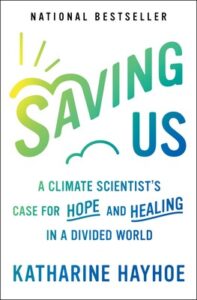 In honor of Earth Day, our April read is Saving Us: A Climate Scientist’s Case for Hope and Healing in a Divided World by Katharine Hayhoe. An evangelical Christian, Hayhoe serves as chief scientist for The Nature Conservancy and the Endowed Professor in Public Policy and Public Law and Paul W. Horn Distinguished Professor at Texas Tech University. She has been named a United Nations Champion of the Earth, the World Evangelical Alliance’s climate ambassador, and one of TIME‘s 100 Most Influential People.
In honor of Earth Day, our April read is Saving Us: A Climate Scientist’s Case for Hope and Healing in a Divided World by Katharine Hayhoe. An evangelical Christian, Hayhoe serves as chief scientist for The Nature Conservancy and the Endowed Professor in Public Policy and Public Law and Paul W. Horn Distinguished Professor at Texas Tech University. She has been named a United Nations Champion of the Earth, the World Evangelical Alliance’s climate ambassador, and one of TIME‘s 100 Most Influential People.
In the bio on her website, Hayhoe explains why, as a Christian, she cares about climate change: “Climate change isn’t just an environmental issue – it’s a threat multiplier. It takes the most serious humanitarian issues confronting us today – hunger, poverty, lack of access to clean water, injustice, refugee crises and more – and it makes them worse.”
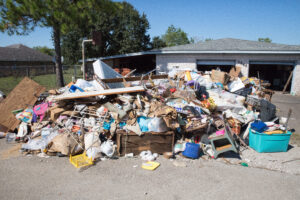
Like Hayhoe, we at Pikes Peak Habitat care about people, and because of that, we care about our climate. Hayhoe’s book differs from many that you might see on climate change, because she sounds a hopeful note. Read with us to learn more about the crisis facing us — and what we can each do to address it!
Questions for discussion and reflection
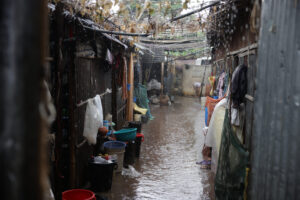
How does she compare messages about the COVID-19 pandemic and messages about climate change?
What is the strongest indicator of someone’s views on climate change? Why is this the case?
According to Hayhoe, why is talking about climate change so crucial — and what makes it so difficult?
What are the six categories into which most people fall regarding views on climate change? Where would you place yourself?
How does Hayhoe advise approaching conversations about climate change? Why might this be more effective than other approaches, such as providing facts or using fear-based arguments?
“Failing to care about climate change is a failure to love.” (p. 19)
Hayhoe talks about finding common ground in order to discuss climate issues, and she provides some examples from her own life. How would you answer these questions, and how do these different aspects of your identity relate to climate change?
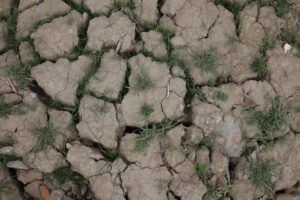
-
- Where do you live?
- What do you love doing?
- Where are you from? How is climate change impacting your home country, culture, or faith tradition?
- Who do you love?
- What do you believe?
- What do you do for work?
How do scientists know that climate change isn’t caused by the sun? by volcanoes? by orbital cycles? by natural heating and cooling cycles?
Throughout the book, Hayhoe describes examples of the impacts of climate change that she and other people have experienced. Which example(s) were most compelling to you, and why?
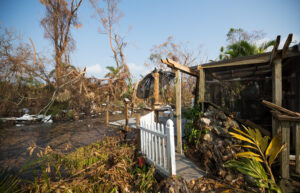
Why does she say that empowering and educating women are effective ways to fight climate change?
How has climate change impacted you personally? Did you learn anything in the book about how climate change is affecting you in ways you might not have realized?
What are some of the examples Hayhoe provides of positive change? Did she make any suggestions that you plan to implement in your own life?
Did you know…
- Pikes Peak Habitat’s construction crews have implemented a variety of energy-efficient features in the new homes we build? These features don’t just save energy — they also keep our homeowners’ utility bills affordable!
- Through a partnership with Colorado Springs Utilities, Pikes Peak Habitat homes are landscaped with waterwise trees, shrubs, and flowers? These features conserve water in our high-desert climate and also ensure that water bills remain affordable for homeowners!
- Our ReStores serve as drop-off centers for metal, paint, porcelain, and textile recycling programs? Through these programs, non-biodegradable and hazardous materials are repurposed as road base, insulation, and more!
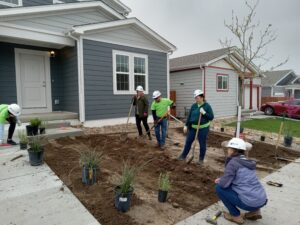
Colorado Springs Utilities staff members volunteer to landscape a Pikes Peak Habitat home with waterwise trees and plants. - By providing people a place to donate unwanted building supplies, home goods, furniture, and other items, and then reselling those items to others in our community, the Pikes Peak ReStores kept 2,579 tons of usable items out of landfills in fiscal year 2023?
- Through our tithe program, Pikes Peak Habitat donates 10% of all undesignated funds to Habitat affiliates in developing countries — currently Bangladesh, the Dominican Republic, and Uganda — and to Habitat’s International Disasters Fund and Orphans and Vulnerable Groups Fund? Through our tithe, we help serve people most in need throughout the world, including those who have been displaced because of climate-related disasters.
Stay tuned for a list of upcoming titles we’ll be reading, including works by authors from our tithe partner countries — Bangladesh, the Dominican Republic, and Uganda!

